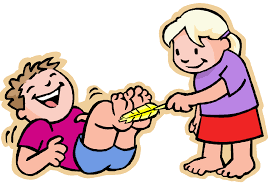tickle
英 ['tɪk(ə)l]
美 ['tɪkl]
- vt. 使发痒;使高兴;使满足
- vi. 觉得痒;(东西)使人发痒
- n. 胳肢;痒感;使人发痒、高兴的东西
- n. (Tickle)人名;(英)蒂克尔
CET6 TEM4
1. tick => tickle.
2. 谐音“蹄抠”-----抠蹄,也就是抠你的脚,使你发痒,看过《倚天屠龙记》吧,你就知道了。
3. 谐音“踢抠”-----又踢又抠,因为痒得很啦。
tickle 呵痒,胳肢可能来自 tick,滴答声,-le,表反复。引申词义触摸,触碰,呵痒等。
- tickle
- tickle: see tick
- tickle (v.)
- early 14c. (intransitive) "to be thrilled or tingling," of uncertain origin, possibly a frequentative form of tick (v.) in its older sense of "to touch." The Old English form was tinclian. Some suggest a metathesis of kittle (Middle English kytyllen), from Dutch kietelen, from a common North Sea Germanic word for "to tickle" (compare Old Norse kitla, Old High German kizzilon, German kitzeln).
Meaning "to excite agreeably" (late 14c.) is a translation of Latin titillare. Meaning "to touch lightly so as to cause a peculiar and uneasy sensation in the nerves" is recorded from late 14c.; that of "to poke or touch so as to excite laughter" is from early 15c.; figurative sense of "to excite, amuse" is attested from 1680s. Related: Tickled; tickling. The noun is recorded from 1801. To tickle (one's) fancy is from 1640s.
- 1. The bigger girls used to chase me and tickle me.
- 比我高大的女孩过去总是追赶着胳肢我。
来自《权威词典》
- 2. If something's bothering you, get it off your chest and tickle your [ the ] mind.
- 有什么不痛快的事, 就把它说出来,你心里也就 敞亮 了.
来自《现代汉英综合大词典》
- 3. Philosophy's queerest arguments tickle agreeably our sense of subtlety and ingenuity.
- 哲学上最奇怪的议点也会愉快地引起我们微妙机敏的感觉.
来自辞典例句
- 4. Wilson was feeling restless. There was a tickle in his throat.
- 威尔逊只觉得心神不定. 嗓子眼里有些发痒.
来自辞典例句
- 5. This morning I got the old tickle in the throat.
- 今天早晨我感到喉咙里发痒.
来自辞典例句
[ tickle 造句 ]
